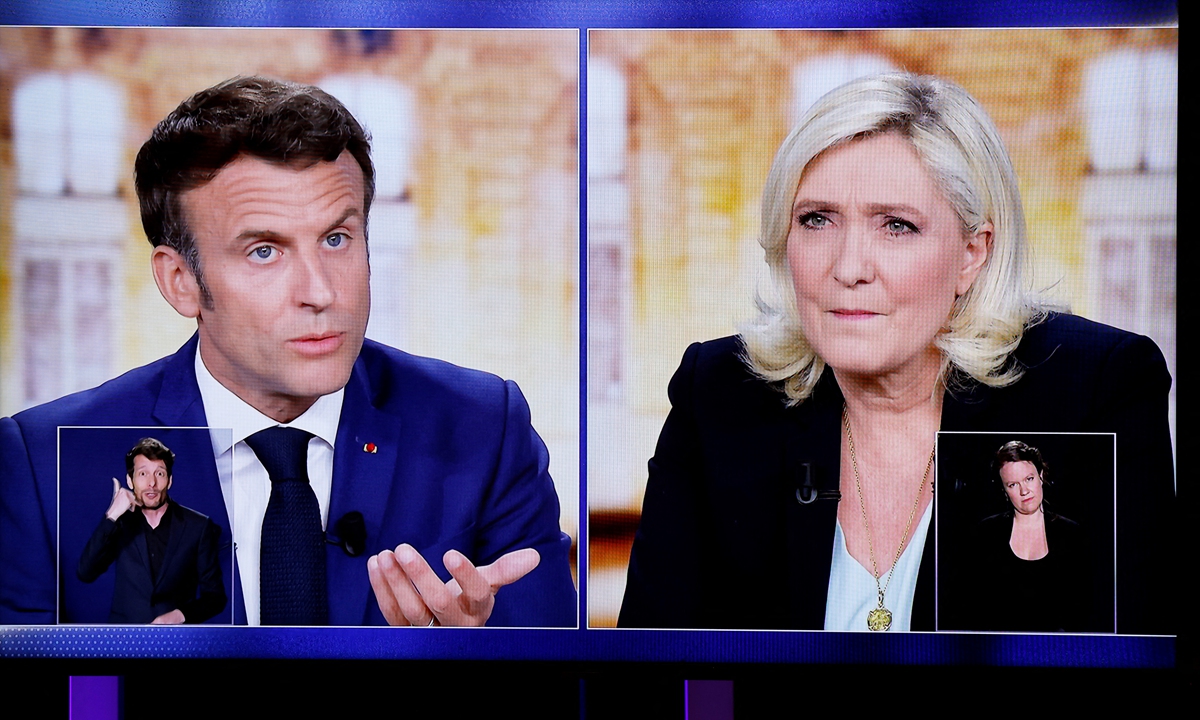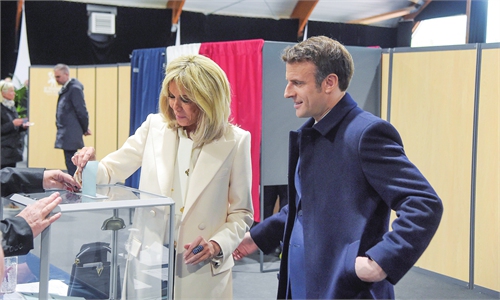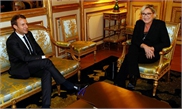
A TV screen displays the debate between Emmanuel Macron and Marine Le Pen.Photo: AFP
Three days ahead of the final vote for French presidential election, the incumbent president Emmanuel Macron and his far-right challenger Marine Le Pen clashed in a televised debate during which Macron attacked Le Pen over her links to Russia, and the latest opinion poll showed that Macron was more convincing.There won't be any "black swan event" in Sunday's election. If Le Pen wins the election, France will become a country with a declining influence on the global stage, which won't be accepted by the ruling class of the EU's second-largest economy.
However, if Macron is re-elected, France is expected to continue playing the leading role in the EU, keeping certain distance from the US and striking a balance on the global stage by actively interacting with major powers like China and Russia.
Following a two-and-a-half hour head-on-head confrontation, the latest survey found that 59 percent of polled viewers found Macron more convincing than Le Pen, Reuters said on Wednesday, and polls of voting intentions for the April 24 election estimate that Macron will win with around 55.5 percent of the vote.
Usually, this final televised debate has little influence over the election result and there's no suspense in this year's election result as Macron is the chosen one by the country's ruling class.
France's ruling class is composed of two groups - the financial capital and industrial capital. That capital, on one side, can be donated to candidates, and on the other side, can easily manipulate the mainstream media to influence the public opinion.
Macron's policies take the benefits of the rich groups and capital into account. After he was elected in 2017, he abolished a wealth tax, which was a very important issue for the rich.
A series of policies under the Macron administration have been apparently favorable for the rich rather than poor people. For example, rising oil prices, which triggered the Yellow Vest movement in the country, heavily weighed on the poor, but it was not within the scope of his consideration.
As expected, the mainstream media in France and other Western countries highlighted Macron's attack against Le Pen over her links with Russia in the latest debate coverage. Reuters said in its analysis that "Macron cleared a major hurdle on the path to re-election with a combative TV debate performance." The AP also mentioned the influence of Russia over French elections by citing a Russian opposition leader who publicly called on voters to back Macron and alleged Le Pen "is too closely linked to Russia."
Using mainstream media to depict candidates in a certain way or distort their political guidelines in order to shape public opinion is common tactics in French elections.
Macron-Le Pen race reminded many observers of the scene in the 2017 presidential campaign as the two faced off in the final round. The French far-right surge over the years has raised questions on whether France is turning into a more divided country, especially when the far-left candidate Jean-Luc Mélenchon took 21.95 percent of the ballots in the first round.
As traditional left-wing and right-wing support globalization, the so-called far-left and far-right voters are against this trend, and the question is how they came up with such a stance. It actually reflects the division inside the country's ruling class.
Although Western financial capital and industries grew quickly thanks to globalization, they have begun opposing globalization as they started to face strong competitors like China.
A large part of the middle class in France is standing by the side of domestic industries and capital, which has been recording a declining share of France's total GDP. Under such circumstance, the number of people in the middle and upper class who support globalization is now shrinking while the number of those in the middle and lower class who oppose it is expanding. This scenario is leading to more support for far-left and far-right candidates like Mélenchon and Le Pen.
However, hundreds of protestors recently expressed their frustration with the two finalists by chanting "Ni Macron, Ni Le Pen" (Neither Macron, nor Le Pen), in the latest movement in Paris ahead of the second voting day. This reflects a severe problem that France is facing - the young generation does not feel much hope like their fathers did. Like Macron said in 2019: "we are living the end of Western hegemony," the elections won't solve this problem.
French voters are actually very disappointed. They've tried right-wing Nicolas Sarkozy, left-wing François Hollande, and Macron who is neither left nor right. But all their attempts have failed. What should they do in this situation? The younger generation is very disappointed.
Macron realized that Western hegemony has ended, and that's why he would continue to keep the distance from the US and closely interact with countries like Russia and India, which will play a positive role for a more diverse global political landscape.
The article was compiled by Chen Qingqing and Bai Yunyi based on the interview with Zheng Ruolin, a researcher at the China Research Institute of Fudan University and a senior researcher at Taihe Think Tank. opinion@globaltimes.com.cn


